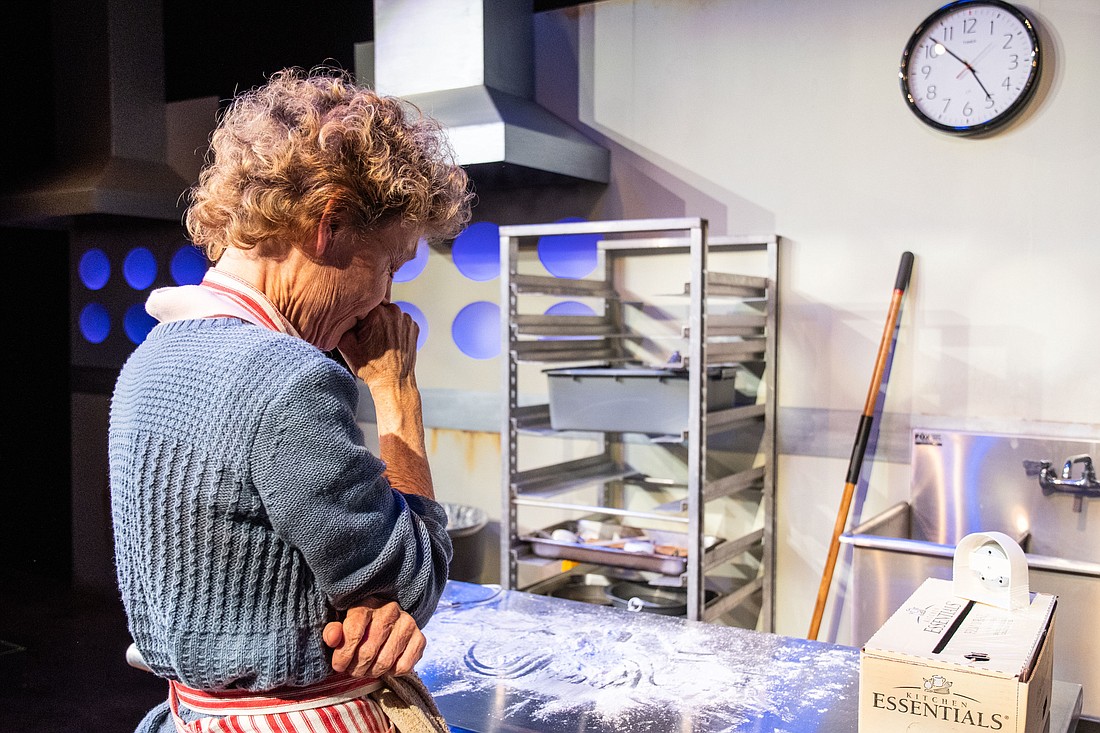- July 8, 2025
-
-
Loading

Loading

Jennifer Fawcett’s “Apples in Winter” is now in the oven at the Urbanite Theatre. It’s a one-woman play about baking a pie. Roxanne Fay plays Miriam, the lead character. Over the course of 75 minutes, she actually bakes an apple pie. But there’s far more to it than that …
Miriam is either thinking out loud or talking to someone you can’t see. The kitchen where she works is ugly and institutional. The knife she cuts with is dull and attached to the scratched, stainless steel counter with a rope. You gradually figure out that Miriam’s in a prison kitchen. She gradually reveals that she’s baking the pie for her son. It’s a yearly ritual, and she’s kept it up after they put him behind bars. For what?
For some horrific crime. Miriam measures out the gory details in small portions, in between chopping apples and kneading the crust. Baking this pie clearly means a lot to her. It brings a taste of a mother’s love into a cold, inhuman world. Still, it’s only a pie. Miriam fights to keep a stiff upper lip as she follows the recipe. But you can tell she’s heartbroken and quietly desperate. Her words are full of pain and amazing self-control. She’s always on the verge of cracking, sometimes going silent with a thousand-yard stare, but always keeping it together. Miriam’s mechanical, routine task helps her keep the lid on — barely. Through it all, you sense unspeakable pain, boiling just beneath the surface. It’s an amazing performance.
Director Kirstin Franklin obeys a simple mantra: Destroy the barriers between audience and performer. On top of that, make the audience uncomfortable. You’re not a safe, anonymous spectator—and this is personal. When Miriam speaks, she’s speaking to you. There’s no place to hide.
Chad Eric Bergman did a beautiful job designing the ugly set. (A realism defined by rust stains and grease.) Dee Sullivan’s costume doesn’t look like a costume — just some old clothes Miriam threw together while her mind was elsewhere. Jo Averill-Snell’s lighting strikes the only expressionist note. Colors shift with the changes in Miriam’s moods. The effect is subtle — and never pulls you out of the stark reality unfolding on stage.
The nature of that reality is no mystery.
Fawcett’s play has few surprises. It is what it is. You can see what’s coming, long before Miriam spells it out. There’s no twist ending, no key hidden in the pie, no revelation of the real criminal.
The plot isn’t the point. Empathy is.
Miriam isn’t alone in today’s society. Many mothers, fathers, sisters, brothers and lovers around the country share her fate. Someone you love did something unspeakable. When they pay for their crime, their punishment is yours. You feel the horror they feel.
It’s a painful story. And a story seldom told.
Kudos to the playwright and the Urbanite team for having the courage to tell it.